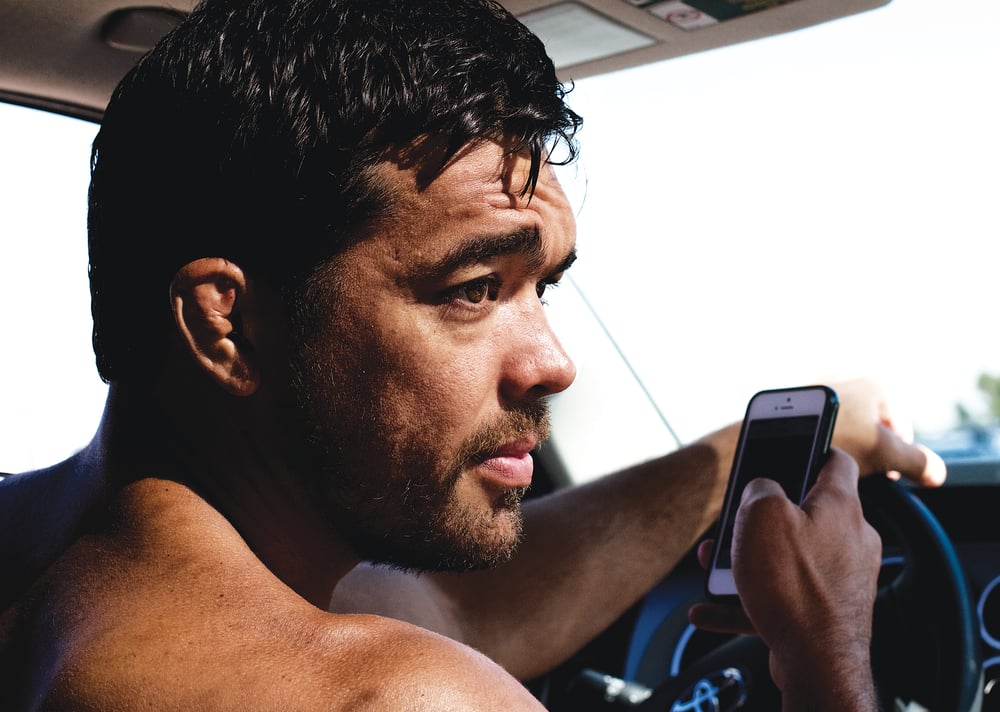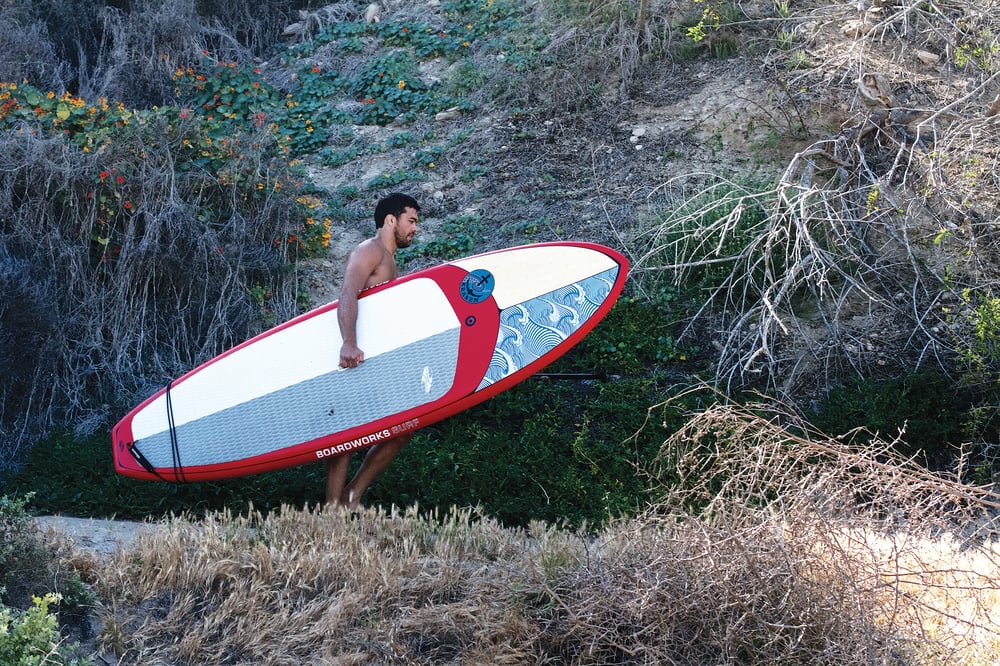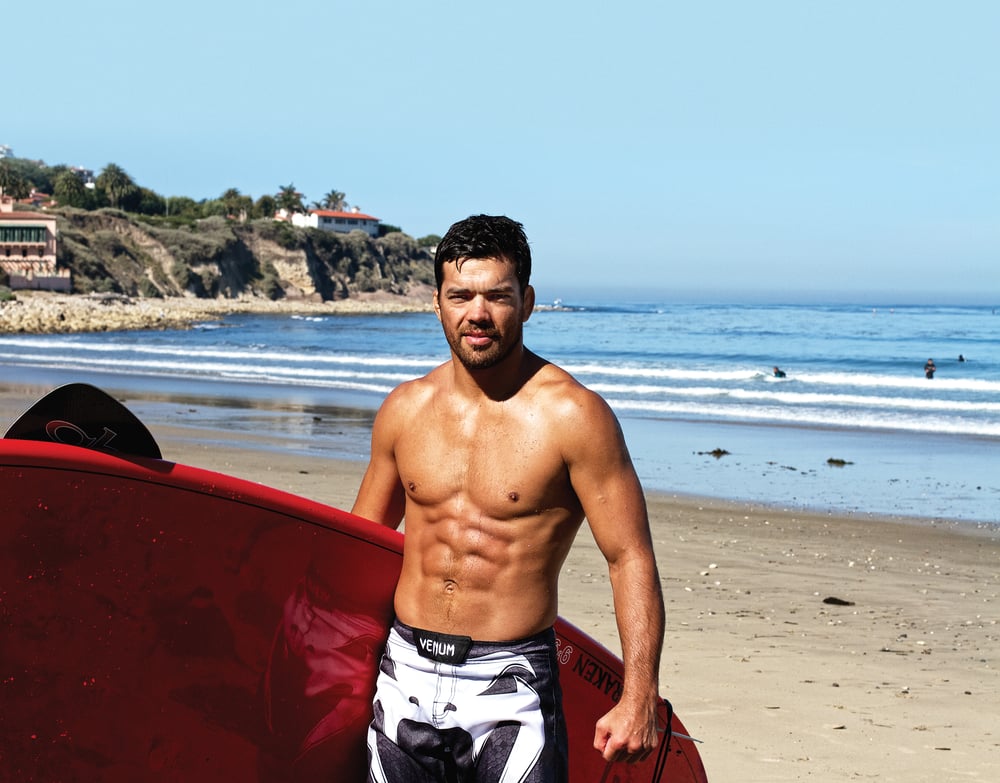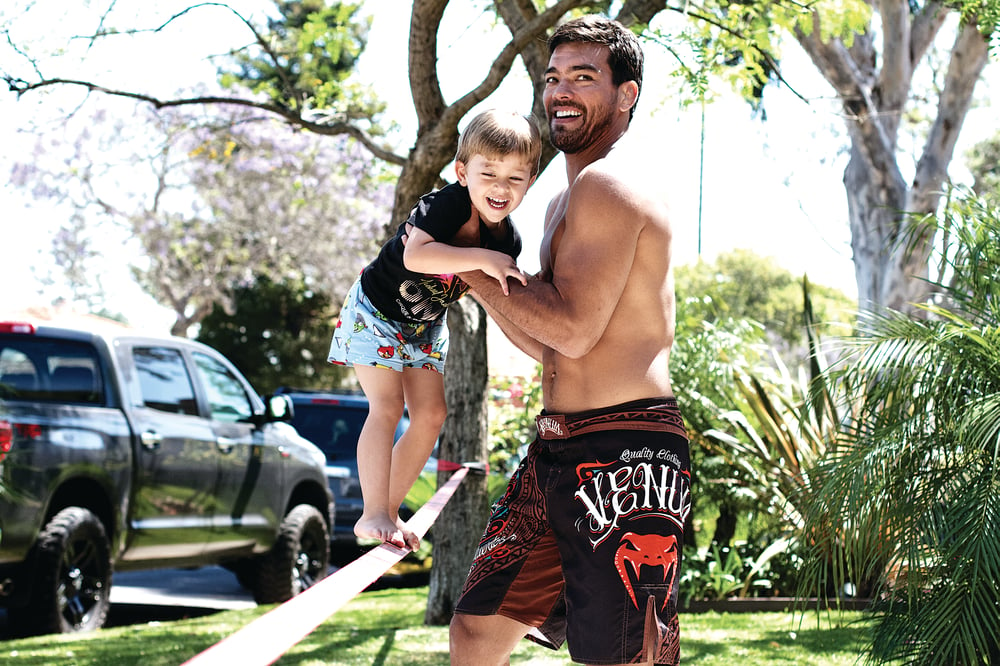
Issue 116
July 2014
Leaner, meaner and keener. After dropping the 20lb to middleweight ‘The Dragon’ Lyoto Machida is breathing new fire. And with his shot at the 185lb title, he can become only the third man to win UFC titles in two weight classes. Is 2014 his time?
Lyoto Machida, the former UFC light heavyweight champion, believes a fighting career mapped out by providence has led him back to title contention this summer. His previous title reign may have lasted just 12 months, ending back in May 2010, but his eight Octagon outings since, garnished with back-to-back standout displays at his new weight of 185lb, have convinced the Brazilian his time has come again.
Now into his 11th year as a professional fighter, ‘The Dragon’ believes his career has come full circle, that he’s actually peaking right now, and that he is mentally and physically prepared to become champion of the world once more. On July 5th, at UFC 175 in Las Vegas, he’ll get his chance.
The familiar circumstances surrounding this latest opportunity are not lost on the challenger. Back in 2009, Machida traveled to Las Vegas to face another then-unbeaten former standout collegiate wrestler. A guy who was taking his weight class by storm and had left UFC icons in his wake. Yet Lyoto knocked out Rashad Evans to claim the 205lb belt at UFC 98, and he suspects there’s a little case of déjà vu fast approaching.
UFC middleweight champion Chris Weidman will put his UFC gold and unbeaten record on the line at UFC 175 in Las Vegas, and while Machida admits he’s not one to believe in fate, he can foresee a similar outcome to all his previous visits to Sin City – that of him emerging with his hand raised.
“There are a lot of similarities, I am aware of that. Both are undefeated and UFC champions, but I don’t put too much focus on that. I am in control of my future, not fate,” Machida explains to Fighters Only.
“I am very confident and very well prepared. I’ve just turned 36 so I’ve got a lot more experience than I did when I fought and won the title the first time around. I am so much more prepared mentally and physically to be champion again.
“Throughout my career, I have endured a lot of different obstacles and adversity, challenges that I believe all brought me to this point, to this night, this chance. The fact Weidman is undefeated and is also a wrestler, or a jiu-jitsu guy, or even a striker, none of that affects me.
“I have faced people with all of these skills during my career already and so I’m equipped to deal with any opponent. I have matured a lot as a fighter and now I am just ready to step up again and become the UFC champion. Perhaps it wasn’t my time before, but I feel it is my time now.”

It’s not only his chance to be king of the mountain once more, but to be only the third man in UFC history to win titles in two weight divisions. He can etch his name into the record books alongside Randy Couture and BJ Penn by taking Weidman’s title just as he did Evans’.
One of the brightest lights in the illustrious Black House stable, Machida enters the Weidman fight with an elephant in the room, however. Or, more accurately, a spider hanging from the rafters of the Mandalay Bay.
Anderson Silva – the man twice put down by Weidman but still considered the biggest draw in the sport, and known universally as the greatest MMA fighter ever – is still preparing his comeback. And should Machida realize his goal in July, where would that leave the two Brazilian stablemates? Interestingly, according to both Machida and Black House head honcho Ed Soares, the answer is: in opposing corners.
Asked if he has thought about the possibility of facing Anderson should his second UFC title reign begin this summer, Machida says: “Those thoughts have, of course, gone through my mind. Ever since I moved down to the middleweight division, this is something I’ve thought about.
“Anderson was a great champion and I aim to become the next champion so it’s possible. I respect Anderson a lot, but I am a professional and this is my job. I would like to avoid fighting Anderson. It’s not something I wish to do necessarily, but if at the end of the day Anderson is able to come back from his situation and put himself in contention to fight for the title, and I am the champion, then it would happen. I guess we’ll cross that bridge if and when it happens.”

Machida has fought friends before. In October he dispatched training partner Mark Munoz with a highlight-reel knockout head kick in the opening round, and admits he would bring the same ferocity to a potential future fight with Silva. Machida says he’d deserve nothing less.
“Fighting cannot be emotional,” states Machida, who scoffed at the idea of training with Anderson in preparation for the Weidman fight. “It is never personal, and at that moment your friend becomes your opponent, nothing more.
“Of course, after the fight with Mark Munoz was finished I was concerned for him and I wanted to make sure my friend was OK. But at that moment he was my opponent, and he knew that before he stepped into the Octagon. And if Mark would have done the same thing to me, well, that’s what I would have expected from him.
“You don’t want your friend to be fooling with you and not giving their best, because that would not be helping you. As a friend you’ve got to give your best against your friend, to really test their ability also. The goal in this sport is to go out there and test yourself against your opponent and so you have to test your friend like he is testing you.
“Afterwards I was happy he didn’t get seriously hurt, of course, but at the end of the day this is a competition and above him being my friend at that moment he was my opponent. It would be the same if I ever fought Anderson.”
And manager Soares, the man who pulls the strings on both Lyoto and Anderson’s fighting careers, agrees. As a fan, Soares understands the validity of a fight should circumstances demand, but from a personal point of view he’s bitter-sweet about any prospective all-Black House title showdown.
Soares says: “I wouldn’t want to see a fight between Lyoto and Anderson, from a personal standpoint. Just because I wouldn’t want to see it. But if Lyoto becomes champion and Anderson goes and gets a couple of wins then both these guys have the right to fight for the title. After all, that’s what they’re both competing for.
“I wouldn’t want to see the fight for personal reasons. But if Anderson gets to the point where he’s back fighting for the belt again then both guys would deserve the fight and I wouldn’t stand in the way.
“As a fan I accept it would be an intriguing fight. But Anderson is not even training at 100% right now, while Lyoto first has to capture the title also. Both these guys are professionals and they only compete to be the best. As a manager and a friend of both it would be a horrible fight for me, but I can’t waste too much time thinking about it. If it comes to it, and that fight has to happen, then it will happen.”

Machida has looked as sharp and clinical as ever since his switch down to 185lb last year. He first dispatched Munoz and then former Strikeforce and Dream champion Gegard Mousasi in February with back-to-back bonus-check-winning performances. In fact, he believes his rediscovered title push is also entwined with a happy home life now his family is settled and in tune with the Southern California lifestyle (he enjoys the sun and surf) after moving to the region two years ago.
Over 11 years in the sport will help too – most of that fought in the sport’s current golden age of success and skill. Yet despite his accomplishments, Machida believes you’re never too old to learn, and his journey within martial arts is far from over. Part of that is taking care of himself as he racks up the years as well as the wins.
New UFC welterweight champion Johny Hendricks revealed he has completely changed the way he spars these days, refusing to take head shots in the gym, while Munoz is part of a clinical study into the effects of fight sports head trauma.
And though Machida’s striking coach, Rafael Cordeiro, insists nothing can replace a good, hard spar, The Dragon reveals he’s actually curtailed his own gym sessions with a more safety-first approach as he’s gotten older.
“There is some validity in what Johny Hendricks is saying and I have changed things somewhat in that I am much more focused now on preparing myself than just going in there and fighting,” he says.
“Sparring is not just that day when everyone goes full throttle against each other, it’s much more technical now. You have to be smart about how you train so you can eliminate the chances of getting hurt. And focus on preparing yourself. It’s much more technical and precise these days, rather than full bore and just going in there to bang.”
Although, when he has to, Machida can bang with the best of them – and usually with devastating results. His 25-fight record is littered with award-winning knockout victories. And while both the Evans and Munoz knockouts bagged bonus cash, it’s his crane kick KO of Randy Couture at UFC 129 that remains the defining moment of the Brazilian’s career.

After starting to learn martial arts as soon as he left the crib under the tutelage of his father and Shotokan karate master Yoshizo, Machida realized at an early age being able to finish off an opponent involved a lot more than just being big and strong.
“I’ve had a few knockouts during my career and have been fortunate in that sense,” he says. “Of course, one which stands out is the KO against Rashad Evans, as it was for the title. And the other one was against Randy Couture as it was such a unique strike, and one that isn’t used in MMA very often.
“I still train that particular kick, but every opponent has a different style and strategy so it’s not always possible to throw it. I still practice it, of course, but it really depends on the opponent. For instance, that particular strike is not something I’m focusing on in preparation for Weidman. His usual fighting style isn’t necessarily suitable for this type of attack.”
He adds: “You can’t go looking to knock somebody out. You have to focus on the fight and focus on applying your strategy rather than looking for a knockout. A knockout will be the result you will receive by properly applying yourself in a fight. If you go in there focusing on the knockout you’ll come up short.
“Confidence plays a big part also. You have to be confident in how you train, have confidence in your team, confidence in your ability, and that goes for striking too. You have to be confident you have the ability to knock the other guy out. You have to believe that the strikes you are using in the fight will be effective and will produce the outcome you deserve most. You have to be confident in that. You have to believe.”
And believing is something Machida is very comfortable with heading into his second UFC title opportunity. Whether fate is on his side or not, the Brazilian’s frame of mind is on the job at hand, while his conditioning is never too far away from fighting fit.
UFC 175 is still a couple of weeks out, but Machida has been in camp full-time since the end of April and, as always, he began in the kind of shape most fighters aspire to reach at the culmination of one.
He says: “I was in Brazil up until the end of April doing some appearances, but I was training before I left there, and since then I’ve been back in California and have stepped things up a level.
“As always my preparation has been based on my strengths, which is my stand-up, and so I work a lot on movement for all of my opponents. And, because I am fighting a guy with a history of good-level wrestling, (grappling coach) Kenny Johnson has had a big role to play in this camp.”

Cool, calm, collected. Chatting with Machida, not for the first time, I find myself thinking he’s already won the title from Weidman, he carries such a strong air of confidence. He admits: “I’m kind of always in camp, always training and getting ready, so the last few weeks are simply my time to sharpen up and get my mind on the fight.
“My father and brothers come over towards the end of my fight camps and they make changes also. So by the time the bell goes I will be very well prepared and concentrating on a good performance.
“I’ve been very relaxed and very focused on this fight ever since it was announced, and I am very confident of becoming the new UFC middleweight champion.”
Perhaps it is the year of the dragon.
Lyoto Machida's guide to the knockout
With eight (T)KO victories on his record, and a lifetime spent mastering the striking arts, few men are better educated on the intricacies of a knockout than Lyoto Machida.
Former UFC light heavyweight king Machida earned that title belt with a knockout victory over Rashad Evans in 2009, and stunned the world by KO’ing the legendary Randy Couture with a ‘crane kick’ two years later. So he knows a thing or two about separating opponents from their senses.
Machida is adamant that it’s nurture, not nature, that holds the key to finishing fights early with strikes.
“I was around 19 years old when I first started to realize that when I hit an opponent with the right timing and in exactly the right spot then he would fall,” Machida reveals.
“I also learned that if I loaded up a strike with power and all my force but mistimed it and it didn’t land cleanly, then the guy wouldn’t fall. I realized early that the right timing and landing in the right place was the key to knocking people out.
“Knockout ability is something you learn and something that gets better with practice. The greatest knockout fighters in history were also likely the ones who practiced their striking more than anybody else.
“When you score a knockout victory you realize your dreams. The feeling of satisfaction is perfect. It’s almost like a dream come true, to be able to finish a fight with a knockout.”
When it comes to landing a fight-ending strike, Machida is quick to state, however, that anyone who goes looking for an early finish will ultimately come up empty-handed. The key to a good KO shot is letting it, rather than making it, happen.
“My main focus going into a fight is not the knockout,” Machida adds. “A knockout is a consequence of applying my game and strategy properly. Of course, every time I step into the Octagon my goal is to knock someone out, because that’s what the fans want to see.
“But I don’t go into the fight thinking about this. I go in focusing on landing my strikes, and executing my game plan. My focus is only on that, and a knockout comes almost like a reward for doing all the other things properly.”










